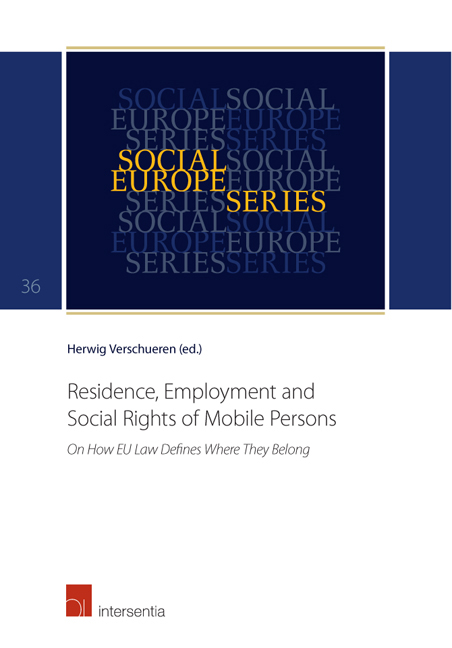Book contents
- Frontmatter
- Preface
- Contents
- List of Abbreviations
- List of Contributors
- Chapter 1 How EU Law Defines where Mobile Persons Belong. An Introduction
- Chapter 2 Family as Link. Explaining the Judicial Change of Direction on Residence Rights of Family Members from Third States
- Chapter 3 The Direction of the Court's Family Reunification Case-Law. A Plea for (Timely) Moderation
- Chapter 4 Sufficient Resources and Residence Rights under Directive 2004/38
- Chapter 5 Free Movement of Persons and European Solidarity. A Melancholic Eulogy
- Chapter 6 Once a Foreigner, Always a Foreigner. Who Does Not Belong Here Anymore? Expulsion Measures
- Chapter 7 Who Does Not Belong Here Anymore? A Statistical Snapshot of Member States’ Practices
- Chapter 8 Civic Integration Exams in EU Immigration Law. What Integration is Not in European Law
- Chapter 9 I Study Here, and Thus I Belong? Mobile Students in the European Union
- Chapter 10 Being Economically Active: How It Still Matters
- Chapter 11 Where Do EU Mobile Workers Belong, According to Rome I and the (E)PWD?
- Chapter 12 Conflicting Rules of Conflict: Social Security and Labour Law
- Chapter 13 Conflicting Rules of Conflict: Social Security and Labour Law. A Response
- Chapter 14 Where Does the UK Belong?
Chapter 9 - I Study Here, and Thus I Belong? Mobile Students in the European Union
Published online by Cambridge University Press: 22 September 2018
- Frontmatter
- Preface
- Contents
- List of Abbreviations
- List of Contributors
- Chapter 1 How EU Law Defines where Mobile Persons Belong. An Introduction
- Chapter 2 Family as Link. Explaining the Judicial Change of Direction on Residence Rights of Family Members from Third States
- Chapter 3 The Direction of the Court's Family Reunification Case-Law. A Plea for (Timely) Moderation
- Chapter 4 Sufficient Resources and Residence Rights under Directive 2004/38
- Chapter 5 Free Movement of Persons and European Solidarity. A Melancholic Eulogy
- Chapter 6 Once a Foreigner, Always a Foreigner. Who Does Not Belong Here Anymore? Expulsion Measures
- Chapter 7 Who Does Not Belong Here Anymore? A Statistical Snapshot of Member States’ Practices
- Chapter 8 Civic Integration Exams in EU Immigration Law. What Integration is Not in European Law
- Chapter 9 I Study Here, and Thus I Belong? Mobile Students in the European Union
- Chapter 10 Being Economically Active: How It Still Matters
- Chapter 11 Where Do EU Mobile Workers Belong, According to Rome I and the (E)PWD?
- Chapter 12 Conflicting Rules of Conflict: Social Security and Labour Law
- Chapter 13 Conflicting Rules of Conflict: Social Security and Labour Law. A Response
- Chapter 14 Where Does the UK Belong?
Summary
INTRODUCTION
In the light of the theme of the seminar organised, this chapter seeks to address the question ‘where do I belong’ for Europe's mobile students. With over 650,000 students leaving their countries of origin to study elsewhere in the European Union, and this number growing more or less steadily over the last few years, this question is indeed of particular significance in the context of both a changing higher education landscape and the recent debates on free movement. The former is mainly visible in the trend of the progressive internationalisation of higher education and the trend towards commodification. Such internationalisation is set to further encourage student mobility flows which puts into greater focus the question of ‘who pays for what’. In addition, the introduction of economic principles and thinking into higher education policy necessitates, as will be argued later on in this chapter, re-evaluating some of the established principles in EU free movement law.
As regards the latter, it is true that students are not directly among those most frequently mentioned in some of the anti-free movement rhetoric that is currently quite a popular pastime among certain European leaders: that dubious honour is instead primarily reserved to persons of independent means, jobseekers, and workers seeking to claim certain benefits. However, indirectly, restrictions proposed on labour market access and the like will also affect the decision of the student considering a study period abroad as job prospects play an important role as a ‘mobility determinant’. Consider further that promised crackdowns on migration have in the past in particular hurt students, and that mobile European students are increasingly portrayed as if they were somehow abusing the system at the cost of taxpayers.
Nevertheless, mobility of students is usually identified as a crucial pivot in the European Union ‘dash for growth’, and the phenomenon is habitually attributed a wide range of economic and civic benefits. As such, a certain ambiguity in terms of desirability can be said to surround this type of mobility in the European Union.
In that context, the purpose of this chapter is twofold. Firstly, it seeks to clarify and bring a degree of coherence to some forty years of case-law and to derive the principles that apply to the question ‘where do I belong’ as a mobile student.
- Type
- Chapter
- Information
- Residence, Employment and Social Rights of Mobile PersonsOn How EU Law Defines Where They Belong, pp. 161 - 186Publisher: IntersentiaPrint publication year: 2016



